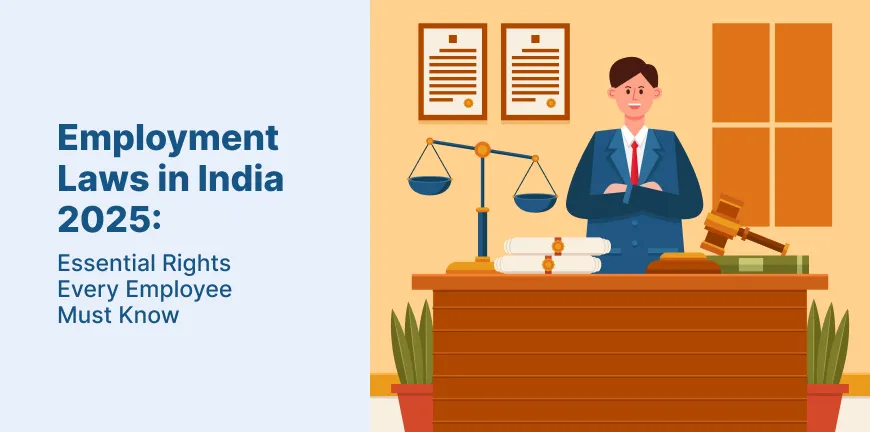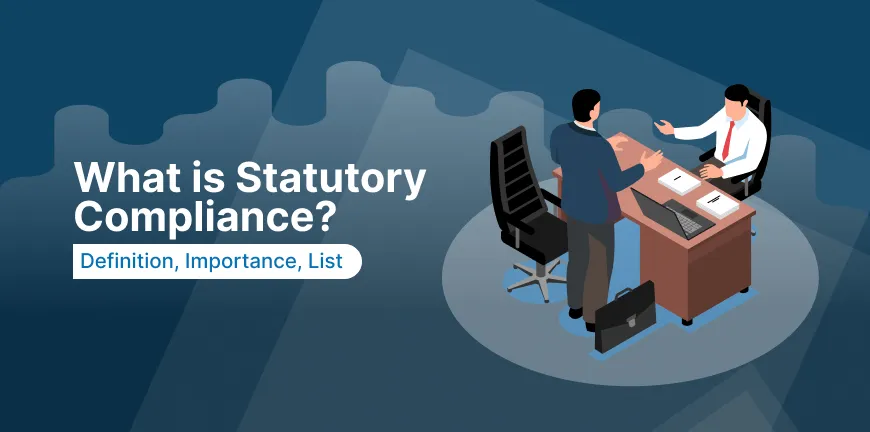
Understand The Difference Between RPO and Staffing
23/08/2022
What are the Global Captive Centers in India? Their Evolving Landscape
10/01/2023- Top 5 Common Compliance Risks
- What is Compliance Risk?
- Why is Compliance Risk a Real Threat?
- Biggest Challenges Faced by Compliance in 2022
- How to Monitor Risks and Maintain Compliance?
- What are the Key Loyalty Penalties Compliance Considerations?
- Bonus Pointers on How to Overcome Common Compliance Challenges
- Conclusion
When it comes to statutory compliance, forewarned is forearmed. There is no doubting the fact that the first step in avoiding common compliance issues is to identify them. Common compliance issues are usually caused by a lack of knowledge about the laws of the land. They are also often caused by an over-reliance on technology, which can create blind spots when it comes to legal requirements or potential risks.
Top 5 Common Compliance Risks
Here are some common compliance risks and issues:
1. Ignorance of your legal obligations
You may know what you need to do to comply with the law but do not know how best to achieve it. There are chances that you are unaware of your reporting obligations or the need for internal controls concerning data protection, for example. This can lead to errors in reporting, possibly with serious consequences for your business.
2. Lack of internal controls
If you want to ensure that your business complies with the law and regulations, there must be clear objectives around how this is achieved. Without some kind of target or measurement system in place, it is very difficult to assess whether a given activity is compliant or non-compliant – especially if there have been no previous incidents or problems with similar activities.
3. Lack of communication between departments
Different parts of a business often have different responsibilities under the law and regulations, which means that any issues arising from one department will easily give rise to others elsewhere within the company too – particularly if these departments are interdependent to conduct functions daily.
4. Preventing theft and fraud
Preventing theft and fraud in your organization is not just a matter of having good security policies and procedures; it’s also about understanding your employees and making sure they understand what’s expected. For example, a salesperson who wants to take a customer’s order over the phone should be trained on how to do so without divulging any confidential information about the product or service being offered to their customer.
5. Combating tax-related issues
The tax laws can change at any time, so companies need to know what they need to do to comply with them as well as provide accurate reports for government agencies. This includes paying taxes on time and accurately reporting income, expenses, and other items required by the IRS.
What is Compliance Risk?
It can be safely said that compliance risk is an offshoot of compliance issues. So, what is compliance risk? It refers to a situation when an employee in the company gives information about the possible illegal activities of other employees, which can lead to more problems. This will also mean that an employee goes against the rules set within the company by doing something illegal or unethical. For example, if a sales manager tells a customer to go through a certain process before purchasing a product, this could be considered a data leak violation. In this case, they may get punished depending on their commitment level to the company.
Why is Compliance Risk a Real Threat?
Compliance risk is a real threat, and business owners should be aware of this. There were more than two billion incidents in the past year alone that affected businesses across all industries.
These kinds of risks are often invisible to the business owner and can result in thousands of dollars being wasted for little reason, without notice or prior authorization. For example, a government agency discovered that over the previous year, you had opened around 1,000 phone calls on your company’s office phone system without logging them in. For each unauthorized call, you paid INR10 per minute of usage. This came to INR 12,000 in lost revenue over 3 months.
Compliance issues can happen when you don’t follow a policy or procedure correctly; or if another employee or vendor does something wrong by not following policies and procedures correctly. Recently, the Reserve Bank of India slapped a penalty of INR 70 lakh on Bank of India for failing to comply with certain rules on ‘Compliance Function in Banks’ and sections of the ‘Reserve Bank of India – (Know Your Customer (KYC)) Direction, 2016’.
Biggest Challenges Faced by Compliance in 2022
The compliance industry is constantly evolving, but some remain constant and refined. Below are the biggest challenges that face compliance professionals in 2022.
1. AML/CFT (Anti-Money Laundering and Countering the Financing of Terrorism)
This is a very important topic in the financial sector, which has been highly relevant to the current financial crisis. As it is required to implement new regulations, banks and other financial institutions should be prepared for these changes. It will also help them to avoid reputation risk and potential fraud.
2. Cybersecurity and data protection
The internet has become an integral part of our lives, but it is also a source of financial crimes such as hacking, phishing, and identity theft. With more than $1 trillion worth of cybercrime every year, it is important for banks to take cybersecurity seriously to protect their customers’ data from malicious attacks by criminals that can lead to serious consequences like identity theft or even financial loss.
3. Data analytics and artificial intelligence (AI)
The industry has been facing tremendous pressure from both customer demands and new technology trends that require faster decision making in order to meet them on time or beat them out altogether; hence they need advanced analytics tools that can help them make better decisions at scale so they can remain competitive in this highly competitive marketplace.
4. Employee Wellness
In recent times, employee mental health and their all round well being have taken the center stage in every company’s policies. Psychological safety is an offshoot of employee wellness. This denotes a work culture where an employee should face no inhibitions in speaking their minds in their workplace. Therefore, the onus lies on compliance officers to reconfigure their company policies such as redoing bereavement policies to foster a workplace that cares for its employees.
How to Monitor Risks and Maintain Compliance?
Effective compliance monitoring requires a team effort, not just one individual. It also requires that you set clear expectations with your employees and vendors.
Here are some tips for monitoring both uncommon and common risks:
- Set clear expectations for compliance
- Provide training for all employees about risk management
- Develop a communications plan
- Make sure all employees understand what they need to achieve in their roles
- Have a risk management program in place.
- Update the compliance program with regular anti-virus updates, continuous monitoring of system logs for signs of attacks or spyware infections, and regular backups of your data stores.
- Keep an eye on your company’s financials.
- Hire a knowledgeable legal counsel who can help you navigate the complex legal issues that arise from regulatory compliance.
What are the Key Loyalty Penalties Compliance Considerations?
In the event you violate the terms of your contract with a customer or a partner, you could be liable for damages and payment penalties. For instance, if you’re a merchant and your customer files a complaint against you because of a shipment delay, you may have to pay an additional fee in addition to the shipping cost. This is a type of loyalty penalty.
On this note, here’s looking at the key loyalty penalty compliance considerations:
- Determining whether the penalty is an indirect or direct penalty. Indirect penalties are imposed for violations that occur after the date of the violation, whereas direct penalties are imposed for violations that occur before the date of the violation.
- Ensuring clarity about incentives. You must make sure that the terms and conditions of the rebate or discount are clear and easy to understand.
- Determining when a customer is deemed to have been aware of a violation and whether it is material.
Bonus Pointers on How to Overcome Common Compliance Challenges
Here’s a short checklist of some important things to look out for:
- Do not look into a colleague’s confidential records; they may contain items shared under an NDA (Non Disclosure Agreement) which you are not privy to, for example
- Do not share passwords which give access to confidential information
- Only raise invoices or bills for services which have already been rendered
- Provide complete documentation for any services
Compliance is crucial for a number of reasons. It sends a clear message both internally and externally. It protects your enterprise from legal repercussions. Just as importantly, it enables the following:
- It demonstrates an honest, responsible culture
- It makes it easier to spot and deal with illegal acts
- It improves quality of services and business repute
- It emphasizes an internal culture of accountability and fairness
Conclusion
Compliance impacts the business prospects and standing of any business deeply; this can be especially crucial in the SME segment, as you work towards carving out a more substantial market share. Reputation is everything, and one slip can undo years of hard work. But the nitty-gritties of ensuring compliance across your processes can demand a degree of knowledge and experience that is hard to procure in-house. Which is why it makes sense to focus on your core business while entrusting your compliance functions to a trusted partner like Alp Consulting.

Hariharan Iyer
Hariharan Iyer is the Vice President – Operations at ALP Consulting, bringing over 40+ years of experience in HR outsourcing and labour law compliance. He leads end-to-end HRO operations, ensuring process efficiency, statutory compliance, and seamless service delivery for clients across industries. With a strong background in labour law governance and workforce management, Hariharan plays a key role in driving operational excellence and compliance-led HR solutions at ALP Consulting.




